About Us:
About ITEP
ITEP Board of Directors
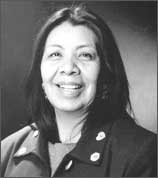 Dr. Octaviana Valenzuela Trujillo
Dr. Octaviana Valenzuela Trujillo
Professor of Applied Indigenous Studies
Northern Arizona University
Dr. Octaviana V. Trujillo has worked for the past four decades in the area of educational and leadership development for
Indigenous Peoples. A primary focus of her work as a tribal leader has been developing programs that take advantage of her
academic and professional experience. She was the founding Director of the American Indian Graduate Center at the University
of Arizona, where she later was Assistant Professor in the Department of Language, Reading and Culture and affiliated faculty
with American Indian Studies. In 1994, Dr. Trujillo became the first woman Chairperson of the Pascua Yaqui Tribe of Arizona.
During her tenured leadership, she established the first department of education for the tribal nation and shepherded state
and national legislation. Dr. Trujillo subsequently served at Arizona State University as Director of the Center for Indian
Education and editor of the Journal of American Indian Education, the nation's longest continually published refereed research
journal on Native education. During her tenure there, she secured extramural research funding that quadrupled ASU’s Native
education research, preparation of Native teachers and graduate students for the professorate. She served as the principal
investigator of US Office of Educational Research and Improvement (OERI) funded Native educator's research project, Native
Educators: Interface with Culture and Languages in Schooling, to prepare Native pre-service teachers to effectively situate
their teaching within the cultural context of Native American communities. Her interest in peace and human rights advocacy
has included work in the Middle East, Mexico, Northern Ireland, Colombia, Ecuador and Bolivia. Dr. Trujillo is the founding
chair of the Applied Indigenous Studies Department at Northern Arizona University. She has been principal investigator of the
National Science Foundation grants, Research Collaborative: Native Science Curriculum and Climate Change: Water and Traditional
Knowledge in the Southwest. Her work on Yaqui ethnohistory and language policy has produced work in three languages and includes
the publications Hiapsi Wami Seewam: Flowers of Life and The Yaqui: A People and Their Place. Most recently, Professor Trujillo
has worked with the United Nations and US Department of State, Fulbright Program with Indigenous Peoples human rights and
leadership development.
She volunteers on local, national and international advisory boards:
- Native American Public Telecommunications
- Environmental Protection Agency, National Advisory Board
- Kellogg Fellows Leadership Alliance
- Institute for Tribal Environmental Professionals
- Partnership for Native American Cancer Prevention
- Confluence Fund - Colorado Plateau Project with the Flagstaff Community Foundation
- Center for Social Inclusion, Alston-Bannerman Sabbatical Fellowship
- Farmworker Justice
- University of Winnipeg President's Advisory Circle
- Global Diversity Fund
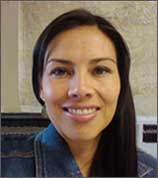 Juliette Jeanne
Juliette JeanneJuliette is ITEP's most recent board member and niece to the late Virgil Masayesva, who was a major influence and supporter in her pursuit of a career in environmental science. Juliette graduated from Stanford University with a B.S. in Earth Systems, Biosphere and a M.S. in Renewable Energy Technology and Sustainable Development. Upon graduation, she was employed by the Reno-Sparks Indian Colony where she helped them to create an air quality monitoring program. In doing so she participated in several technical trainings and air quality workshops offered by ITEP's Tribal Air Monitoring Support Center. She then moved on to serve as Director of Development and Special Projects for the High Sierra Energy Foundation in Mammoth Lakes, California, before committing herself full-time as a Water Quality Specialist for the Bishop Paiute Tribe. During the seven years she worked for the Bishop Paiute, she helped the Tribe attain Treatment as a State Status and establish their own water quality standards for the reservation. In a desire to be closer to her family, Juliette recently accepted a position with Bureau of Indian Affairs Fort Apache Agency in Whiteriver, Arizona where she has been serving as an Environmental Protection Specialist for the past year and a half, overseeing environmental compliance and project management. She was recently nominated to serve on the National Interagency Burned Area Emergency Response (BAER) Team and assist with the development of emergency stabilization plans where post-wildfire impacts pose immediate and significant threats to human life and property. What she loves most about her current position at Fort Apache Agency is the diversity of projects and field work she is continually tasked with along with the close proximity to her home and family. Juliette is honored to serve on the board and looks to bring her experience in furthering ITEP’s vision of increasing environmental capacity and strengthening tribal sovereignty.
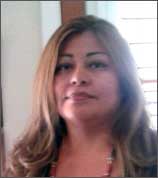 Chelsa Seciwa
Chelsa SeciwaOwner of Caring 4 Angels LLC
Provider for Children and Adults with Disabilities
Chelsa is the eldest daughter of Calbert Seciwa, former Director of ITEP. The Seciwa family has lived in Tempe Arizona since 1988.
As A young girl, I grew up learning the ways of a Zuni woman, prepare our cultural foods, help butcher sheep, make oven bread and learn our Zuni prayers. My father brought us to Tempe when He started off as the first director of The American Indian Institute in 1988, since I was raised in the reservation, I learned to adjust to the urban way of life. As the child of the Badger clan and daughter of the Muster seed plant, I have embraced and instilled these teachings to my three children today.
I have used what was taught to develop my own company, called Caring 4 Angels, which is still in the process of being completed, I care and provide Habilitation to those who are in need of my services. I have also assisted ASU's American Indian Student Services in facilitation of the Feast and Fest in memory of my Father, Cal Seciwa. In the mean while, continue to network for the Cal Seciwa scholarship fund at ASU.
I am still striving for my BSN, and continuing to learn and teach the Zuni way of life.
Ehla:kwa,
Chelsa Antoinette Seciwa
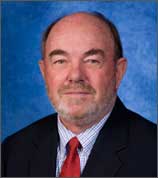 William Auberle, P.E., BCEE
William Auberle, P.E., BCEEPrincipal, EN3 Professionals, LLC
William M. (Bill) Auberle maintains an active engineering practice as a Principal of EN3 Professionals, LLC. Concurrently, he is a Professor Emeritus of Civil and Environmental Engineering in the College of Engineering, Forestry, and Natural Sciences at Northern Arizona University.
From 1980 through 1990 Professor Auberle was a practicing consulting engineer and manager. His professional expertise and experience include environmental management, air pollution control, solid and hazardous waste management, and environmental risk analysis. Professor Auberle was President of the national environmental consulting firm of Yates & Auberle, Ltd. In this capacity he directed professionals in the disciplines of environmental engineering, industrial hygiene, hydrogeology, and environmental monitoring and analysis.
Prior to entering business and education, Professor Auberle served governmental agencies as an author and administrator of environmental laws and regulations. His responsibilities have included the direction of programs in air quality management, water pollution control, radiation protection, noise control and solid/hazardous waste management. In l978 and l979, Professor Auberle managed all environmental protection programs for the State of Colorado.
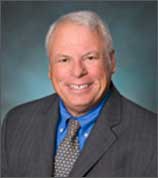 Roger Ferland
Roger FerlandAn Arizona native, Roger Ferland has practiced in the areas of environmental and natural resources law in both the public and private sector since 1975. Mr. Ferland's recent experience includes:
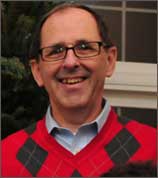 David R. LaRoche, Ph.D.
David R. LaRoche, Ph.D.Senior Advisor (Retired)
U. S. EPA's Office of Air and Radiation
David LaRoche spent more than three decades working in support of air quality management at the U. S. Environmental Protection Agency in Washington, DC. After a number of years working in the area of resources management, including developing a critical understanding of the many factors that contribute to air pollution and the key federal strategies for reducing it, in the mid-1990s he began work to apply his experience to conditions in Indian country. The Clean Air Act Amendments of 1990 included a provision that authorized Indian tribes to implement the CAA within the exterior boundaries of the reservation and in other areas over which the tribes could demonstrate jurisdiction. In 1995, he assumed responsibility for finalizing the rule that would authorize tribes to implement that provision on tribal lands. After promulgating the rule in February, 1998, he worked with ITEP to develop and present workshops on the Tribal Authority Rule (TAR). These workshops brought together tribal environmental professionals to give them a better understanding of the framework provided in the TAR for implementing the CAA in Indian country. In 2000, David accepted a two-year temporary assignment at Northern Arizona University (NAU) to support its new Center for Sustainable Environments as well as the Institute for Tribal Environmental Professionals.
In addition to working directly with ITEP in support of tribal programs, as the Senior Indian Program Manager for the Office of Air and Radiation (OAR) at EPA during this period, David also provided valuable liaison work with the EPA to ensure the tribal needs were adequately integrated into EPA's air programs. He helped to develop a network of EPA staff in the Regional Offices who were working on a routine basis with tribal staff to develop air programs. This network met regularly by phone and semi-annually at a conference site to discuss issues related to implementation of the CAA in this new context and to work collaboratively to develop solutions. He also worked with EPA's budget staff to ensure that the tribes' resource needs for program implementation were included in EPA's budget requests to Congress. Upon returning from NAU to EPA in 2002, David continued his support of tribal interests at EPA as OAR's representative on EPA’s Tribal Science Council until his retirement in 2012.
For more information please contact:
ITEP General Information
itep@nau.edu

